Civics - Class 9
Democratic Politics - I
Chapter 1: What is Democracy? Why Democracy?
What is democracy? Why democracy? is the 1st chapter from NCERT Civics textbook of class 9. Here in this chapter, we will first start by discussing the introduction of the chapter, followed by the what is democracy why democracy questions and answers.
Introduction
Class 9 civics chapter 1 what is democracy why democracy NCERT Solutions gives students a clear understanding of our nation's democratic traditions. In earlier lessons, students must have learnt in previous classes and have already read about several forms of governance. Here, students will have a clear understanding of what democracy is and why it is necessary after reading this chapter. You can gain a better understanding of this subject by answering the chapter end exercise's questions. NCERT Solutions for what is democracy why democracy class 9 questions and answers has therefore been made available on Champstreet.
Intext Questions:
Question 1: I have heard a different version. Democracy is off the people, far (from) the people and (where they) buy the people. Why don’t we accept that?
Answer:
In some cases, the democracy is off the people far (from) the people and (where they) buy the people. It means where the democracy does not belong to the people it is not for them but far away from them and where the democracy is not by the people but the candidates buy the votes with money. It means ideal democracy is still distant from reality.
But we should not see these examples and be hopeless. These problems can be rectified with passage of time with proper usage of electronic media.
Question 2: Let us take Lyngdoh Madam seriously and
try to write down the exact definition of some of the simple words that we use all the
time: pen, rain and love. For example, is there a way of defining a pen that
distinguishes it clearly from a pencil, a brush, a chalk or crayon.
- What have you learnt from this attempt?
- What does it teach us about understanding the meaning of democracy?
Answer:
(i) From this conversation, I have learnt that by our simple thinking we can understand about any matter ourselves. We have to think about its meaning and evolve a definition. Each and every thing has some specific characteristics on the basis of how we can define that thing.
(ii) We need a definition only when we come across a difficulty in the use of a word. We need a clear definition of democracy because there are different kinds of governments which are known as Democracy. Abraham Lincoln said that Democracy is a rule of the people, for the people and by the people.
We must not accept the definition, just because everyone accepts it. We do not know if this is the best way of defining democracy, unless we think about it ourselves. After thinking about it we can say that democracy is a form of government in which the rulers are elected by the people. This is a common basic feature of democracy.
Question 3: Ribiang went back home and collected some
more famous quotations on democracy. This time she did not mention the names of the
people who said or wrote these. She wants you to read these and comment on how good or
useful these thoughts are:
- Democracy gives every man the right to be his own oppressor.
- Democracy consists of choosing your dictators after they’ve told you what
you think it is you want to hear.
- Man’s capacity for justice makes democracy possible, but man’s inclination
to injustice makes democracy necessary
- Democracy is a device that insures we shall be governed no better than we
deserve.
- All the ills of democracy can be cured by more democracy.
Answer:
The first and second points are about those forms of government in which the people can elect their ruler without having options. It means they have to elect the candidates chose by the ruling party. In the third thought, it suggests that if man is following justice, then democracy is possible. But when the man follows injustice, then democracy is necessary there to give justice to others. In the fourth thought, it suggests that there must be a balance between the form of government and our need. The main purpose of democracy is what it gives to its citizens.
Democracy recognises our needs and enhances our dignity. In the last thought, there is a chance for modifying the features and characteristics of democracy as per our needs. There is no guarantee that mistakes cannot be made in democracy. The advantage is that there is a scope for correction through amendments. Either the rulers have to change their decisions or the rulers can be changed. In this way, the disadvantages of democracy can be corrected.
Question 4: This cartoon was drawn when elections were held in Iraq with the presence of US and other foreign powers. What do you think this cartoon is saying? Why is ‘democracy’ written the way it is?
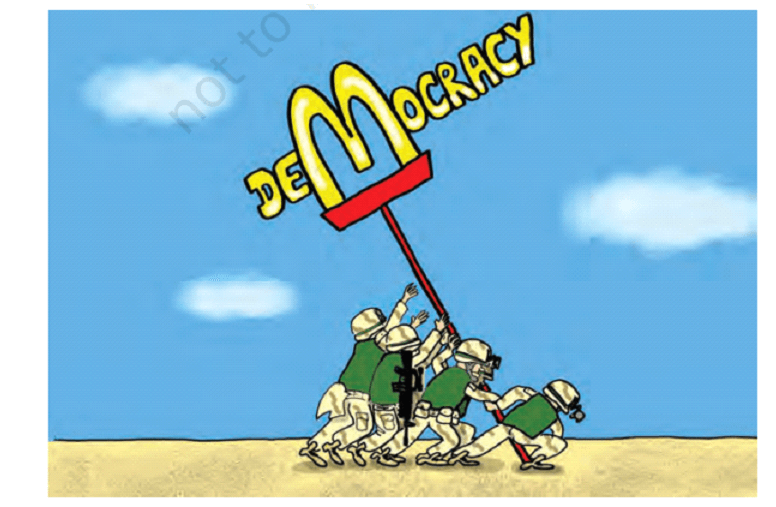
Answer:
- The cartoon is saying that democracy is being established in Iraq with the help of the US military power.
Question 5: Syria is a small west Asian country. The ruling Ba’ath Party and some of its small allies are the only parties allowed in that country. Do you think this cartoon could apply to China or Mexico? What does the crown of leaves on democracy signify?
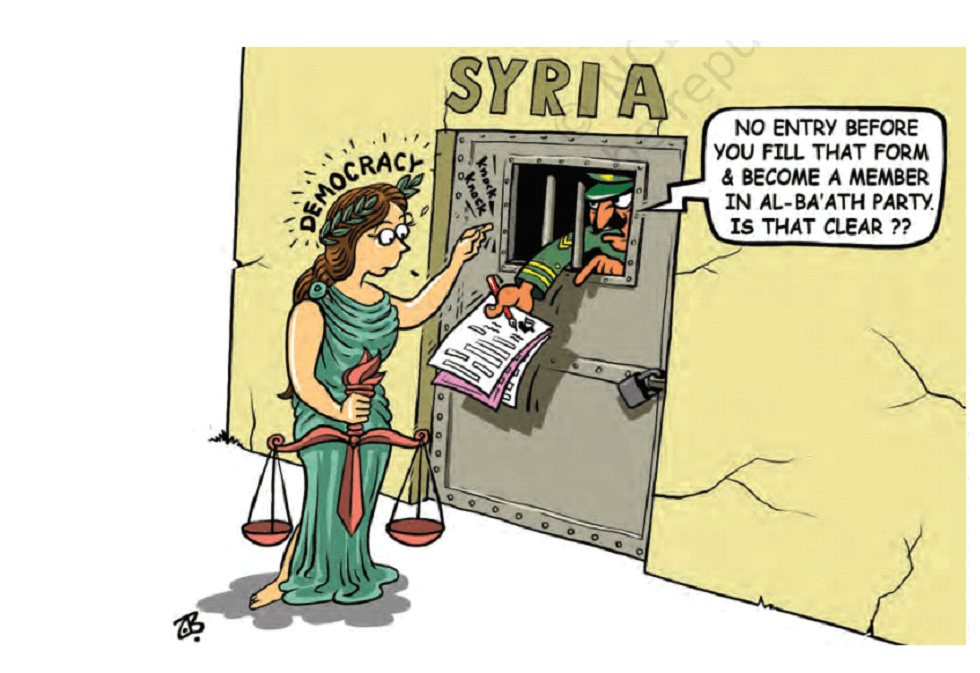
Answer:
(i) Yes, this cartoon could be applied to China, because there is one party rule in China. A candidate needs the approval of the Chinese communist party before contesting elections in China. So China is never a true democracy.
Mexico has a multiparty system. Nationally there are three large political parties, viz, Institutional. Revolutionary Party (IRP), National Action Party (NAP), and Party of the Democratic Revolution (PDR). But until 2000 every election was won by the IRP. The IRP was used many cheating methods to win elections. So the cartoon can be applied to Mexico until 2000 election. But in 2006, election the PRI fell to third place behind both the PAN and the PRD. Now Mexico has a coalition government.
(ii) Olive leaves represents peace. Crown of leaves means a circle of leaves that is worn on somebody's head as a sign of victory. This cartoon shows that democracy has won in some of the countries of the world in a peaceful way, but it is not accepted by all.
Question 6: This cartoon was drawn in the context of Latin America. Do you think it applies to the Pakistani situation as well? Think of other countries where this could apply? Does this happen sometimes in our country as well?
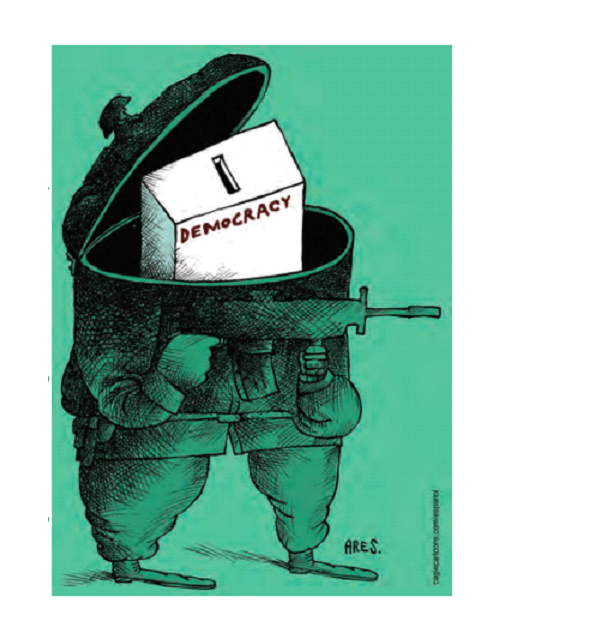
Answer:
(i) The cartoon suggests the scene of booth capturing, an election malpractice with the gun. This can be applicable to the Pakistan. In Pakistan, General Musharraf with the help of army officials controlled the elected representatives.
(ii) This could be applied in Iraq, China, etc.
(iii) Booth capturing by the political hooligans happens sometimes in our country also.
Question 7: All this is so remote for me. Is democracy all about rulers and governments? Can we talk about a democratic classroom? Or a democratic family?
Answer:
- Democracy is not only about rulers and governments. Democracy is a principle that can be applied to any sphere of life. A democratic decision involves consultation with and consent of all those who are affected by that decision. Democracy can be applied to any institution other than government where decision of everyone in that institution is equally valued.
- We can have democratic classrooms where the students can ask questions without hesitation. The teachers have a democratic temperament, so that the interaction is not a one-way traffic but a healthy two-way interaction.
- Democracy can be seen in families also. We could have democratic families where the decisions are not taken by any one individual and imposed on rest of the family members. All the family members should sit down and arrive at a general concensus through peaceful discussions.
Question 8: This cartoon was titled ‘Building Democracy’ and was first published in a Latin American publication. What do moneybags signify here? Could this cartoon be applied to India?
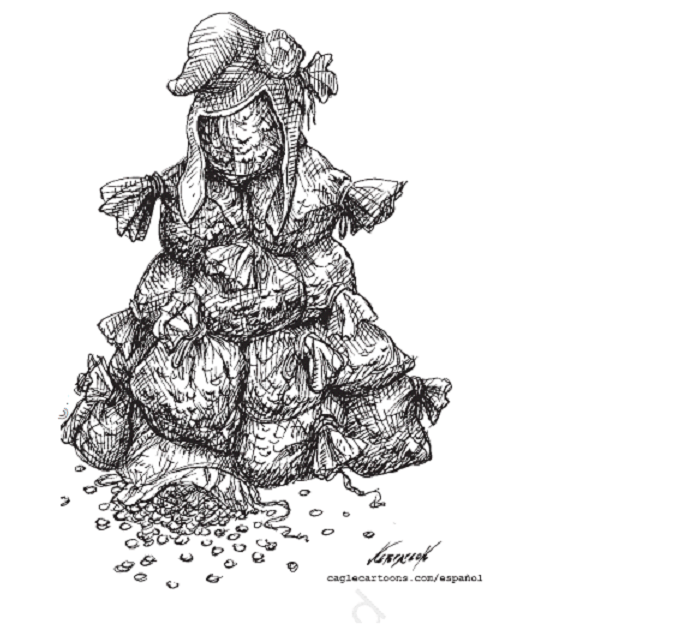
Answer:
(i) At the time of election, the political parties in the fray spend a lot of money to
win the election. Not only political parties, the government also spend a lot of money
to conduct free and fair election. The cartoon suggests that we establish democracy with
the help of money power.
(ii) Yes, this cartoon could be applied to India.
Question 9: This cartoon is about the Iraqi election held after Saddam Hussein’s regime was overthrown. He is shown behind the bars. What is the cartoonist saying here? Compare the message of this cartoon with the first cartoon in this chapter.
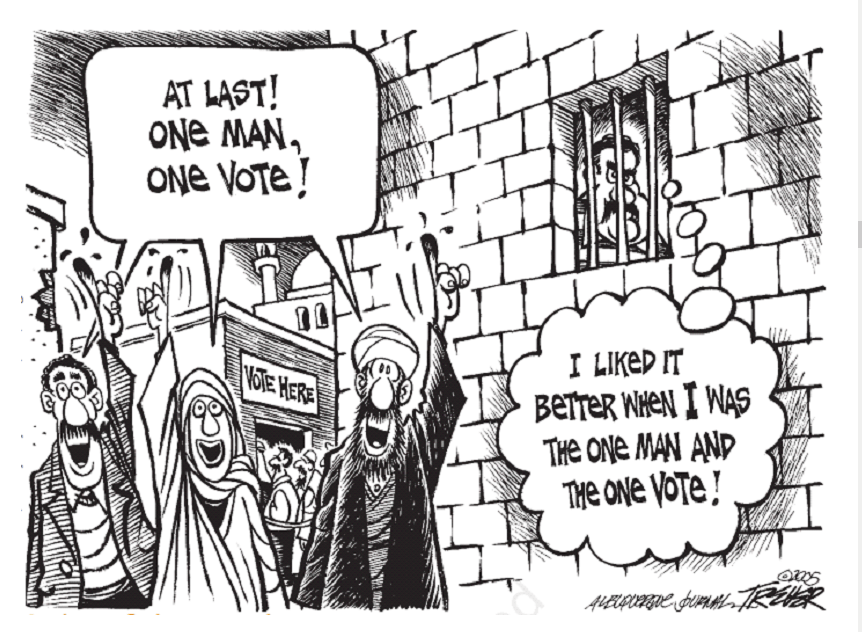
Answer:
(i) In this cartoon, cartoonist is telling us about the equality of the right to vote and equal value of vote given to each man. The quote said by the person jail shows that he is a dictator; he prefers the situation when he is the only man to decide any matter by his only vote.
(ii) The main difference between the first cartoon in this chapter and this cartoon is that the first one suggests that the US army personnel are elevating the process to form a democracy in Iraq. But in this cartoon the message is that the democracy is already established.
Question 10: Why talk about Zimbabwe? I read similar reports from many parts of our own country. Why don’t we discuss that?
Answer:
(i) The President of Zimbabwe is
the
head of the state of Zimbabwe. In 1987, Robert Mugabe becomes the president and he
revises the Constitution to make himself Executive President. President Mugabe is
popular but also uses unfair practices in elections. Opposition party workers are
harassed, public protest and demonstration against the government are declared illegal,
both print and electronic media are controlled by the government.
The government has pressurised judges to give verdict in favour of the government. The
example of Zimbabwe shows that popular approval of the rulers is necessary in a
democracy, but it is not sufficient. A democratic government cannot do whatever it
likes, simply because it has won the election. This is the reason for which Zimbabwe is
discussed here.
(ii) Our country is democratic and elections are by and large free and fair. However,
sometimes we hear reports about use of unfair means, violence and money power in
elections. These tactics (methods) are adopted by some candidates with criminal
connections or criminal background. However, such cases are decreasing day by day.
Question 11: Chinese government blocked free flow of information on the internet by placing restrictions on popular websites like ‘Google’ and ‘Yahoo’. The image of tanks and an unarmed student reminds the reader of another major event in recent Chinese history. Find out about that event.
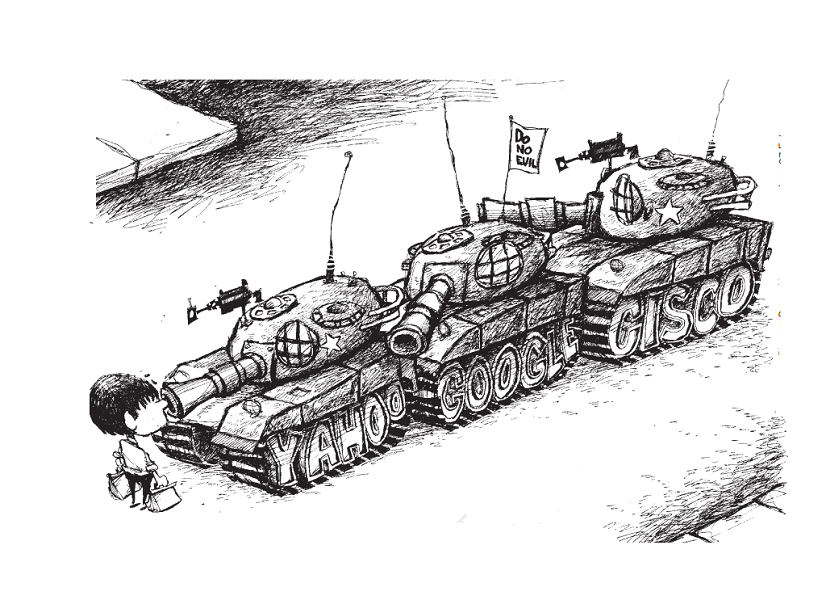
Answer:
The cartoon reminds us of the
Massacre in liananmen square in 1989. In April 1989, triggered by the death of Hu
Yaobang, a liberal reformer mass gathering and protests took place in and around
Tiananmen Square in Beijing. It was largely a student run demonstration which called for
economic reform, freedom of the press and political liberalization. The Chinese government suppressed the protest brutally and forcefully. It was criticized by the international arena.
Question 12:
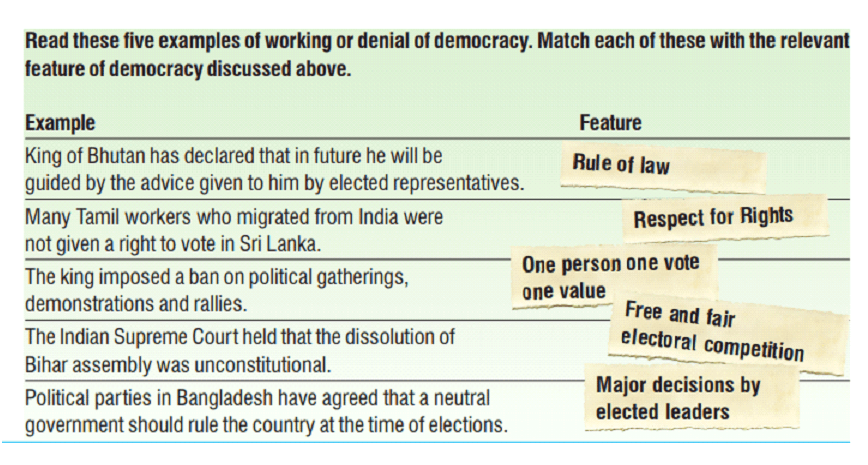
Answer:
| Example | Feature |
|---|---|
| (i)King of Bhutan.......representative | Major decision by elected leaders |
| (ii)Many Tamil workers.....Sri Lanka | One person ,one vote ,one value |
| (iii)The King of Nepal.....Rallies | Respect for Rights |
| (iv)The Indian Supreme Court .......unconstitutional | Rule of Low |
| (iv) Political parties.....time of elections | Free and fair electroal competition |
Question 13: I want to be in Lyngdoh Madam’s class! That sounds like a democratic classroom. Doesn’t it?
Answer:
Yes, Lyngdoh Madam's classroom sounds like a democratic classroom. Here everybody can speak his own mind. The students are giving their own arguments passionately. They can express their opinions freely in front of others. Here two way interaction is allowed unlike one way traffic.
Question 14: This cartoon is from Brazil, a country that has long experience of dictatorship. It is entitled “The Hidden Side of Dictatorship”. Which hidden sides does this cartoon depict? Is it necessary for every dictatorship to have a hidden side? If possible, find this out about the dictators including Pinochet in Chile, Jaruzelski in Poland, Sani Abacha in Nigeria and Ferdinand Marcos in the Philippines.
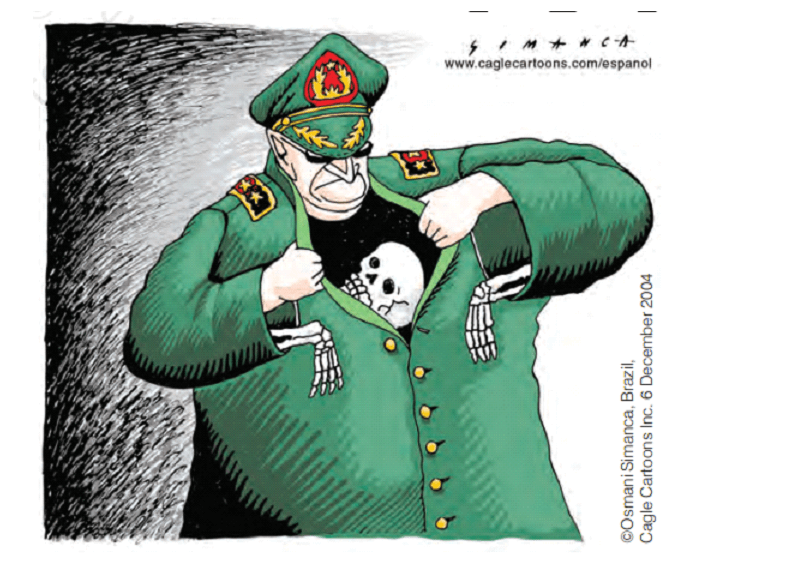
Answer:
(i) The hidden side depicted by the cartoon is the brutal side to the dictator. Dictator
like Hitler ordered mass killings, to eliminate 'undesirable' persons. Like Hitler many
dictators killed the innocent people who were against their regime.
(ii) No, it is not necessary for every dictatorship to have a hidden side. Because, if
the dictator really wants to work for the betterment of people, he does not need to have
a hidden side.
(iii)
(a) The revolt by the army took place in Chile on 11th September 1973 under General
Augusto Pinochet in which President Salvador Allende was killed. Pinochet became the
president the country and ruled it for the next 17 years.
(b) Wojciech Witold Jaruzelski was the last communist leader Poland who was the head of
the state from 1985 to 1990. He resigned from the power after the Polish Round table
Agreement in 1989 that led to democratic elections in Poland.
(c) General Sani Abacha was a Nigerian military dictator and politician. He was the
defacto president of Nigeria from 1993 to 1998. His regime was tied to human rights
violations and allegations of corruption. He hanged the famous social activist Ken
Saro-Wiwa. He did not allow democratic process like elections in Nigaria. He was listed
as the world's fourth most corrupt leader in recent history.
(d) Ferdinand Emmanuel Edralin Marcos was the president of the Philippines from 1965 to
1986. He implemented wide-ranging) programs of infrastructure development and economic
reform. However, his administration was marred by massive authoritarian, political
repression and human rights violations. In the 2004, Global Transparency Report, Marcos
appeared in the list of the world's corrupt leader. He was said to have amassed between
$ 5 billion to $ 10 billion in his 21 years as President of Philippines.
Question 15: What would have happened if India was not a democracy? Could we have stayed together as a single nation?
Answer:
No, we would have not stayed together as a single nation if India was not a democracy.
India has multi-religious, multi-cultural and multi-linguistic population. If there was
no democracy then all the people could not have followed their religion and customs with
freedom and there would have been conflicts between different religious and linguistic
groups where the minorities would have lived in fear and insecurity. But democracy
provides the peaceful solutions to every problem. It provides the best method of dealing
with differences and conflicts.
Question 16: This cartoon was published in Canada just before its parliamentary elections of 2004. Everyone, including the cartoonist, expected the Liberal party to win once again. When the results came, the Liberal Party lost the elections. Is this cartoon an argument against democracy or for democracy?
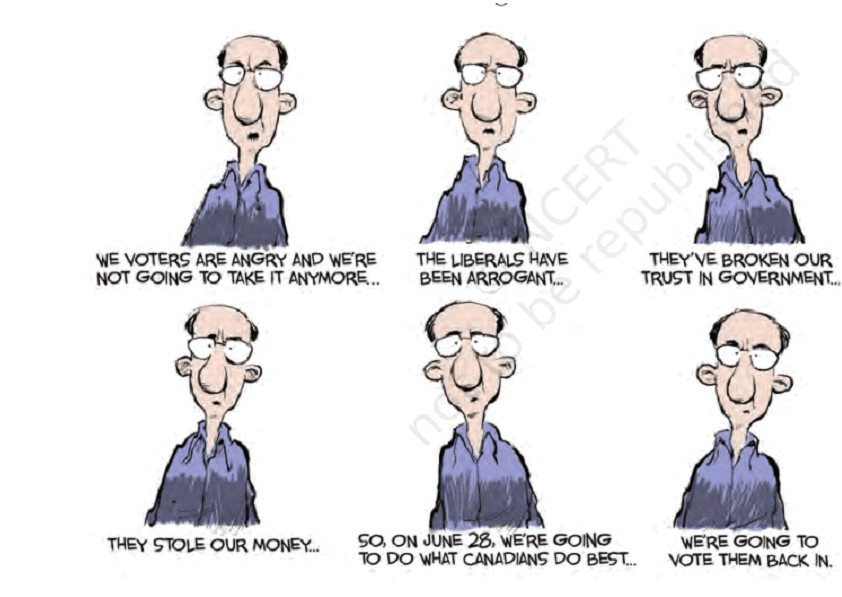
Answer:
This cartoon is an argument for democracy. Because in democracy, the voters decide in favour of or against the ruling party. Although the cartoonist expected the Liberal Party to win, he criticized the Liberal Party which he could do only in a democracy form of government.
Question 17: Rajesh and Muzaffar read an article. It showed that no democracy has ever gone to war with another democracy. Wars take place only when one of the two governments is non-democratic. The article said that this was a great merit of democracy. After reading the essay, Rajesh and Muzaffar had different reactions. Rajesh said that this was not a good argument for democracy. It was just a matter of chance. It is possible that in future democracies may have wars. Muzaffar said that it could not be a matter of chance. Democracies take decisions in such a way that it reduces the chances of war. Which of the two positions do you agree with and why?
Answer:
I, some how agree with
Muzaffar's
argument. In democracy, the decision is taken after discussion and keeping in view the
welfare of the people. So, the chances of war are minimized in democracy, but we cannot
say that it is not possible. Some wars were fought between two democracies like India
and Pakistan, e.g., 'Kargil War' when both countries were democratic countries.
Question 18: This famous cartoon by R K Laxman comments on the celebrations of the fifty years of independence. How many images on the wall do you recognize? Do many common people feel the way the common man in this cartoon does?
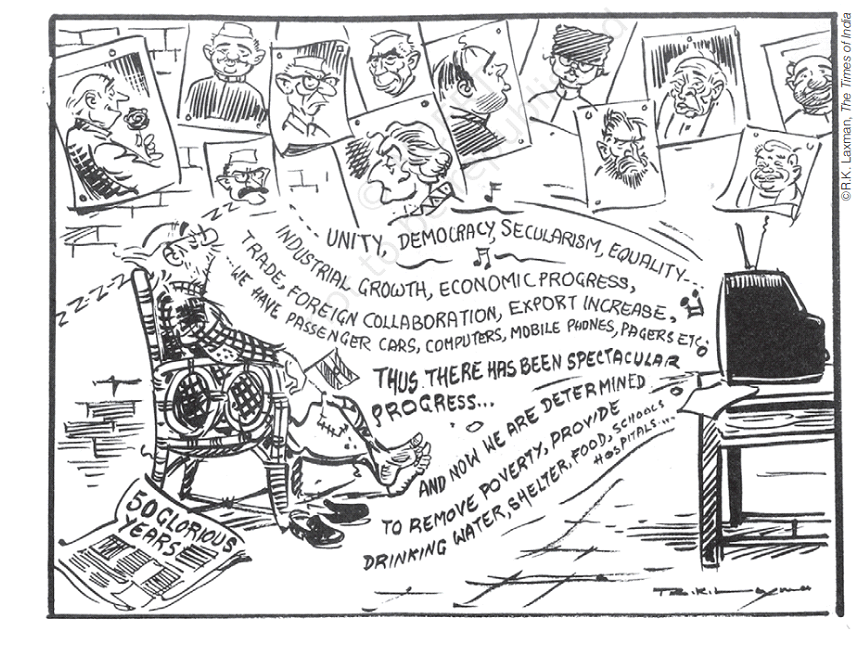
Answer:
(i) The images on the wall are the images of former Prime Ministers of India. They were
Pt Jawaharlal Nehru, Lal Bahadur Shastri, Gulzari Lal Nandu, Morarji Desai, Choudhary
Charan Singh, Indira Gandhi, Rajiv Gandhi, VP Singh, Chandra Shekhar, Narasimhan Rao,
Devegowda and A B Vajpayee .
(ii) Yes, the common people feel the way the common man in this cartoon does. After 50
glorious years of Independence, the condition of the common man has changed very little.
The claims and promises of the politicians became meaningless to the common man, so he
fell asleep by hearing these again. It is a true picture of present situation of common man in a democracy like India.
Question 19: In my village the Gram Sabha never meets. Is that democratic?
Answer:
The Gram Sabha should meet regularly
to carry out its functions for the welfare of the people but if the Gram Sabha does not
meet that would not be democratic, it would be undemocratic.
Question 20: Find out the total number of eligible voters in your assembly constituency and your parliamentary constituency. Find out how many people can fit into the largest stadium in your area. Is it possible for all the voters in your parliamentary or assembly constituency to sit together and have a meaningful discussion?
Answer:
i) No of voters in my assembly constituency named Allagadda in Kurnool district of
Andhra Pradesh state are 2,20,612
My Parliamentary constituency is Nandyala in Kurnool district of Andhra Pradesh. No of
voters here is 15,76,945.
ii) Largest stadium nearby me is osmanis college ground in kurnool district of Andhra
Pradesh state. It's strength is around 20,000 members.
(iii) No, it is not possible. It is impossible for all the voters in my Parliamentary or
Assembly Constituency to sit together and have a meaningful discussion. The large number
of voters cannot sit together for taking a decision.
Exercise
Question 1: Here is some information about four countries. Based on this information, how would you classify each of these countries. Write ‘democratic’, ‘undemocratic’ or ‘not sure’ against each of these.
(a) Country A: People who do not accept the country’s official religion do not have a right to vote
Answer: Undemocratic
(b) Country B: The same party has been winning elections for the last twenty years
Answer: Not sure
(c) Country C: Ruling party has lost in the last three elections
Answer: Democratic
(d) Country D: There is no independent election commission
Answer: Undemocratic
Question 2: Here is some information about four countries. Based on this information, how would you classify each of these countries. Write ‘democratic’, ‘undemocratic’ or ‘not sure’ against each of these.
(a) Country P: The parliament cannot pass a law about the army without the consent of the Chief of Army
Answer:Undemocratic
(b) Country Q: The parliament cannot pass a law reducing the powers of the judiciary
Answer:Undemocratic
(c) Country R: The country’s leaders cannot sign any treaty with another country without taking permission from its neighbouring country.
Answer:Not sure
(d) Country S: All the major economic decisions about the country are taken by officials of the central bank which the ministers cannot change.
Answer:Not sure
Question 3: Which of these is not a good argument in
favour of democracy? Why?
(a) People feel free and equal in a democracy
(b) Democracies resolve conflict in a better way than others
(c) Democratic government is more accountable to the people
(d) Democracies are more prosperous than others
Answer:
Economic prosperity depends on many factors; like availability of natural resources, quality of human resources, finance, geopolitical scenario, etc. Democracies are more prosperous than others cannot be seen as a good argument in favour of democracy.Question 4: Each of these statements contains a democratic and an undemocratic element. Write out the two separately for each statement.
(a) A minister said that some laws have to be passed by the parliament in order to conform to the regulations decided by the World Trade Organisation.
Answer: The fact that the laws need to be passed by the parliament is democratic, while conformation to the WTO regulations is undemocratic.
(b) The Election Commission ordered re-polling in a constituency where large scale rigging was reported.
Answer: Re-polling is democratic, while rigging is undemocratic.
(c) Women’s representation in the parliament has never reached 10 per cent. This led women’s organisations to demand one-third seats for women.
Answer: Poor level of women’s representation is undemocratic, while the demand for one third seats is a progressive step towards more democracy.
Question 5: Which of these is not a valid reason for
arguing that there is a lesser possibility of famine in a democratic country?
(a) Opposition parties can draw attention to hunger and starvation.
(b) Free press can report suffering from famine in different parts of the country.
(c) Government fears its defeat in the next elections.
(d) People are free to believe in and practise any religion.
Answer: (d) Paying money to government officials to get water.
Question 6: There are 40 villages in a district where the government has made no provision for drinking water. These villagers met and considered many methods of forcing the government to respond to their need. Which of these is not a democratic method?
(a) Filing a case in the courts claiming that water is part of right to life.
(b) Boycotting the next elections to give a message to all parties.
(c) Organising public meetings against government’s policies.
(d) Paying money to government officials to get water
Answer: (d) Paying money to government officials to get water.
Question 7: Write a response to the following arguments against democracy:
(a) Army is the most disciplined and corruption-free organisation in the country. Therefore army should rule the country.
Answer:
Army officers are not elected by people and hence an army rule would be undemocratic.
(b) Rule of the majority means the rule of ignorant people. What we need is the rule of the wise, even if they are in small numbers.
Answer:
Democracy is based on the idea of universal adult franchise. Restricting the rulers from
a small section comprising of ‘wise’ people would defeat the purpose of representational
democracy.
(c) If we want religious leaders to guide us in spiritual matters, why not invite them to guide us in politics as well. The country should be ruled by religious leaders.
Answer:
Religious leaders are not elected by people and hence a country should not be ruled by
religious leaders.
Question 8: Are the following statements in keeping with democracy as a value? Why?
(a) Father to daughter: I don’t want to hear your opinion about your marriage.In our family children marry where the parents tell them to.
Answer:
In this case, the daughter does not have the freedom of choice, hence this is undemocratic.
(b) Teacher to student: Don’t disturb my concentration by asking me questions in the classroom.
Answer:
The teacher may be involved in thinking about an important topic and hence is asking the student not to disturb her. It cannot be said with surety whether the teacher’s request is democratic or not.
(c) Employee to the officer: Our working hours must be reduced according to the law.
Answer:
The employee is asking for a fundamental right and hence it is democratic.
Question:9 Consider the following facts about a country and decide if you would call it a democracy. Give reasons to support your decision.
(a) All the citizens of the country have right to vote. Elections are held regularly.
Answer:
Regular elections and universal adult franchise are two important features of a
democracy and hence this is a democratic situation.
(b) The country took loan from international agencies. One of the conditions for giving loan was that the government would reduce its expenses on education and health.
Answer:
An international agency should not interfere in the internal matters of a country. Hence
this is undemocratic.
(c) People speak more than seven languages but education is available only in one language, the language spoken by 52 percent people of that country.
Answer:
This is an example where majority view is being imposed and hence is undemocratic.
(d) Several organisations have given a call for peaceful demonstrations and nationwide strikes in the country to oppose these policies. Government has arrested these leaders.
Answer:
Democratic government should provide the right to protest. The government is denying
such right to its citizens and hence is undemocratic.
(e) The government owns the radio and television in the country. All the newspapers have to get permission from the government to publish any news about government’s policies and protests.
Answer:
Freedom of media is very important for a democracy. This is an undemocratic example.
Question 10: In 2004 a report published in USA pointed
to the increasing inequalities in that country. Inequalities in income reflected in the
participation of people in democracy. It also shaped their abilities to influence the
decisions taken by the government. The report highlighted that:
- If an average Black family earns $ 100 then the income of average White family
is $ 162. A White family has twelve times more wealth than the average Black
family.
-
In a President’s election ‘nearly 9 out of 10 individuals in families with
income over $ 75,000 have voted. These people are the top 20% of the population
in terms of their income. On the other hand only 5 people out of 10 from
families with income less than $15,000 have voted. They are the bottom 20% of
the population in terms of their income.
- About 95% contribution to the political parties comes from the rich. This gives
them opportunity to express their opinions and concerns, which is not available
to most citizens.
- As poor sections participate less in politics, the government does not listen
to their concerns – coming out of poverty, getting job, education, health care
and housing for them. Politicians hear most regularly about the concerns of
business persons and the rich.
Write an essay on ‘Democracy and Poverty’ using the information given in this report but
using examples from India.
Answer:
There is no denying fact that poverty has a direct and deep impact a democracy. Modern
democracy is a form of government run by the rich section of society. The rich control
the media and use it for their own benefit. Influence of the rich over politics is
clearly visible in the countries like England, USA and India. In India, only rich can
contest the election.
The poor people are bought and sold. The poor cannot fight elections against the rich
and get elected. As a result, the rich influence the government when it takes decisions
about the policies. The government formed by the different politicians pays much
attention to the interests of the business class and rich sections of the society.
As poor people participate less in our Parliamentary democracy, their interests viz,
education, employment, healthcare, housing problems etc are neglected. Our government
has taken many Welfare Scheme like Mahatma Gandhi National Rural Employment Guarantee
Act (MGNREGA), The Swarna Jayanti Gram Swarozgar Yojana (SGSY), Indira Awaas Yajona
(IAY) etc.
But their implementation is far from satisfactory. Like USA and in India different
political parties pay more attention to the concerns of the rich who contribute most of
their funds.